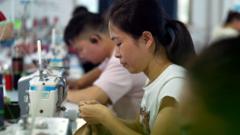The hum of sewing machines echoes across Guangzhou's Panyu neighborhood, known as the "Shein village." Here, countless factories operate tirelessly to produce clothing that will be sold in over 150 countries. Workers report grueling hours—often 75 a week—with as few as one day off a month. While Shein has quickly grown into the world's largest fast fashion retailer, valued at approximately $66 billion, questions surrounding its labor practices continue to mount.
Despite Shein's claims of commitment to fair treatment and governance improvements, its factories have been linked to reports of harsh working conditions and allegations of child labor. Interviews with factory employees reveal that many earn low wages based on the quantity of clothing produced, significantly below the living wage needed in China. The pressure to meet demands from Shein, which sources the majority of its products from China, compels factory owners to cut costs and reduce worker pay.
The conversations in Panyu’s alleyways reflect a system where workers calculate potential earnings while examining job ads. Many workers express their struggles with rising living costs and the need to support families. The environment remains competitive, as factory owners contend with low profit margins due to Shein's pricing practices.
Compounding the issue of fair wages, the working hours frequently exceed the legal limit set by Chinese law, sparking criticism from labor rights advocates. The combination of minimal pay and extreme working hours illustrates the darker side of Shein’s success story, raising vital questions about sustainability in the fast fashion industry and the ethical treatment of workers.
As Shein prepares for a potential IPO, the onus falls on the company to enhance transparency and address its labor practices. Critics argue that only by improving conditions and fully disclosing its supply chain can Shein maintain investor confidence and consumer trust amid growing scrutiny.
Despite Shein's claims of commitment to fair treatment and governance improvements, its factories have been linked to reports of harsh working conditions and allegations of child labor. Interviews with factory employees reveal that many earn low wages based on the quantity of clothing produced, significantly below the living wage needed in China. The pressure to meet demands from Shein, which sources the majority of its products from China, compels factory owners to cut costs and reduce worker pay.
The conversations in Panyu’s alleyways reflect a system where workers calculate potential earnings while examining job ads. Many workers express their struggles with rising living costs and the need to support families. The environment remains competitive, as factory owners contend with low profit margins due to Shein's pricing practices.
Compounding the issue of fair wages, the working hours frequently exceed the legal limit set by Chinese law, sparking criticism from labor rights advocates. The combination of minimal pay and extreme working hours illustrates the darker side of Shein’s success story, raising vital questions about sustainability in the fast fashion industry and the ethical treatment of workers.
As Shein prepares for a potential IPO, the onus falls on the company to enhance transparency and address its labor practices. Critics argue that only by improving conditions and fully disclosing its supply chain can Shein maintain investor confidence and consumer trust amid growing scrutiny.



















